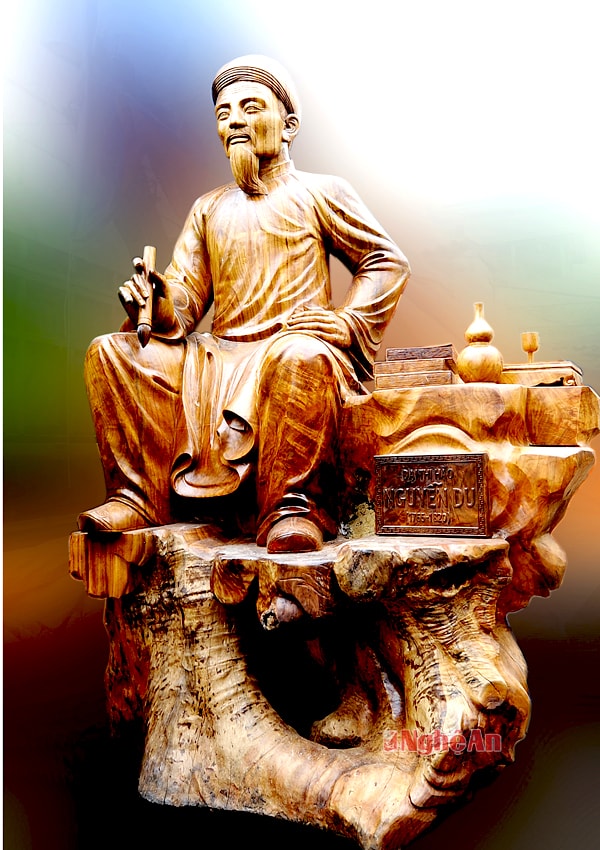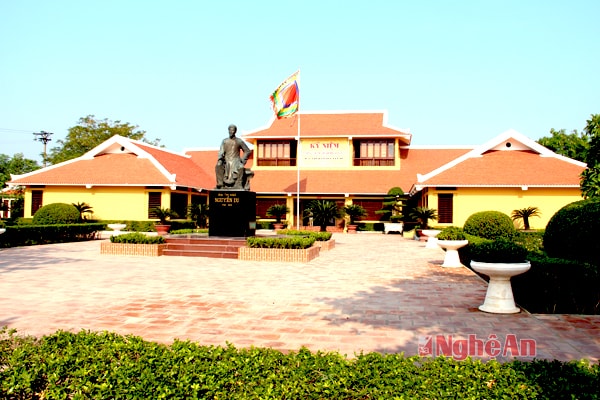"A hundred years in this human world..."
(Baonghean) - Who among us has not heard our grandmothers or mothers sing that lullaby in their lives? She, our mother, with her brown shirt fluttering, her mouth warm with the smell of betel, bent down beside the hammock, gently rocking her child's sleep and saying "a hundred years". A hundred years, a thousand years, or forever after, Nguyen Du's "Kieu" is still a song of fate.
Because when singing that lullaby, our mother, she seemed to be expressing, as if she was unburdening, as if she was looking in the mirror and seeing herself in it, as if she was sympathizing, as if she was being supported... Mr. Nguyen had such talent and love, as if he had eyes that could see through a hundred years, as if he had a heart that ached for a thousand lifetimes.
 |
| Lullaby with Kieu verse (Internet photo) |
My grandmother, a woman who lived in exile all her life, in her most lonely and miserable moments, only the Tale of Kieu could console her and help her rise up. I often fell asleep on the old blanket of the dark room, at the head of the bed, under the mat, was a tattered copy of the Tale of Kieu that my grandmother had gotten from me. She kept that book as if it were a treasure…
My grandmother only learned enough to know the characters and spelling, and did not understand many of the Sino-Vietnamese words used in Nguyen's poems, but she knew 3,254 lines of Kieu by heart. And even though she knew the entire Tale of Kieu, and could not read fluently, she always kept that old, tattered copy of Tale of Kieu by her bedside. Sometimes, I saw her lift the book in her hand, touching each line as if to pray. I tried to understand something in her thin hands and her white hair that was bending down and shaking slightly... There are secret feelings of Vietnamese women who have spent their entire lives quietly and sacrificing, which can only be understood through the pages of Kieu. In the poem I wrote for her, the verse came to mind when I remembered that image: "She bent her back to carry a line of Kieu."
Later, when I grew up, I had the opportunity to study, travel, and meet many people who were fascinated by Nguyen's "Kieu" and had special respect for the great poet. Not to mention literary researchers such as Professor Le Dinh Ky, researcher Nguyen Quang Tuan, Pham Dan Que, poet Vuong Trong, linguistic experts such as Professor Nguyen Tai Can, but also many other ordinary, simple people. The country women who "could not read, but read the Tale of Kieu backwards". The teachers who could teach "Kieu" until they forgot about time.
Like literature teacher Nguyen The Quang (formerly a teacher at Huynh Thuc Khang school, currently living in Vinh city), when he left the podium, he became a writer with the historical novel "Nguyen Du" (first published in 2010) about the life of Nguyen. To write "Nguyen Du", teacher Nguyen The Quang did not mind many difficulties, especially health, to research, ponder related documents and travel to all provinces such as Bac Ninh, Thai Binh, Quang Binh, Hue and the places where Nguyen Du used to live... Was he looking for historical traces? Of course! But I believe that he also wanted to find what people call "inspiration". Perhaps with each footstep he took, he hoped that under the silent sand and dust of a hundred years, there was Nguyen's footprint, hoping that the thread from the past connecting to today would vibrate with the rhythm of reunion.
Or like the officer of TH Milk Joint Stock Company (Nghia Dan, Nghe An) Nguyen Le Huy, one day suddenly became known by the media as the owner of the largest statue of Nguyen Du made of rosewood in Vietnam (just established a record in November 2015). He - an ordinary Vietnamese citizen, spent years, spending time hiring workers to find someone to carve the statue of Mr. Nguyen from the root of a precious tree that was almost a thousand years old. When I asked, why did he think of Mr. Nguyen? He answered, very simply: "He is a famous person of Vietnam. Who among us Vietnamese does not know his Tale of Kieu, who does not ponder over it, who does not grow up from its lyrics?"
 |
| The statue of Nguyen Du made of rosewood was painstakingly carved by Mr. Nguyen Le Huy. |
I have stood under the wooden statue of Le Huy many times, from the time the statue was completed in Vinh until it was put on display at the Nguyen Du Memorial Site in Nghi Xuan. Touching the wood grain crystallized from the thousand-year sun and wind in the great Nghe An region, the carvings made of sweat and wishes, the blood-stained brush, the far-sighted eyes, to see that "Nguyen Du's pain is not only for Kieu". I used that verse from the poet Tran Quang Quy. His poem "Nguyen Du" was written recently, when he returned to Tien Dien on the occasion of the 250th anniversary of Nguyen Du's birth. It is one of three poems from his strange sleepless night.
 |
| Memorial site of the great poet Nguyen Du in Nghi Xuan (Ha Tinh) |
He said: On a rainy night in Vinh, friends invited each other to drink coffee on the 33rd floor of Muong Thanh Hotel. From here, looking at Vinh city, shimmering and magical in the rain, the feeling was so strange. Late in the afternoon, a friend and I visited Nguyen Du's grave in Tien Dien, the sky was still clear, but when we got back to Vinh, it was raining, I kept thinking about it. Suddenly, a friend texted: "Guess where is Kieu from?". I looked at my girlfriend who was also contemplating a cup of coffee watching the rain in Vinh, I don't know why I replied right away: "Nghe, where else?". That night, I stayed up all night and wrote 3 poems, including "Tien Dien Rain". I don't know if Nguyen Du's Kieu or the Kieu next to me inspired me. That was the first poem I wrote about this topic and thoughts. I am from the generation of modern, innovative poets, very little influenced by Luc Bat, because I was afraid, Nguyen Du's Luc Bat was already the best. But the main influence is the soul of a great poet and his profound contemplation of human affairs.
 |
| Hometown wharf |
Once, I met musician Nguyen Tai Tue. After almost a lifetime away from home, his voice is still imbued with Nghe An culture. His hometown Thanh Chuong is also a land that cherishes and preserves many cultural values of Nghe An, including the Tale of Kieu. Dinh Chu village, Thanh Tuong commune is known as the place where two ancient versions of Kieu are still preserved. Nguyen Tai Tue himself, since childhood, listened to his grandmother and mother recite and recite Kieu, so that later, along with the folk songs, the Kieu verses would forever echo in the musician's soul, blending into his lyrics and melodies.
“Dreaming of Homeland” is the only work that Nguyen Tai Tue wrote directly about his homeland, and it is filled with nostalgia for the beloved Thanh Chuong land of a wandering son. That son, after many years away from home, every time he remembers the old Vi tune and the Kieu verse sung in his grandmother’s and mother’s lullabies, he chokes up with tears. “I ask if the Vi Giằng verse has missed an appointment with anyone, and I pity the Kieu verse that has missed an appointment with the old moon…”. All those memories leave a feeling of pity in Tai Tue’s heart. He confided: “I love the Kieu verse of my childhood, the Kieu verse of my grandmother, of my mother, of the Thanh Chuong people, the Kieu verse of the Vietnamese people.” He carried the Kieu verse and that love with him during more than half a century of exile, so that “Dreaming of Homeland” always haunts the hearts of the Vietnamese people.
 |
| A corner of Nghi Xuan (Ha Tinh), the hometown of the great poet Nguyen Du |
Fate has given me refuge in Nghe An. Whenever I have free time, I often return to Tien Dien, always feeling “wistful” when touching the land of Nguyen’s homeland. Standing in front of Giang Dinh with the gentle breeze, I hear the echoes of Kieu’s play, and the “grunting” of Ca Tru from Co Dam. Who is the boatman, who is the general? The moment I bow my head to receive the silence of the green grass in the afternoon, that green color seems to be haunted for a hundred years.
Thuy Vinh
| RELATED NEWS |
|---|
